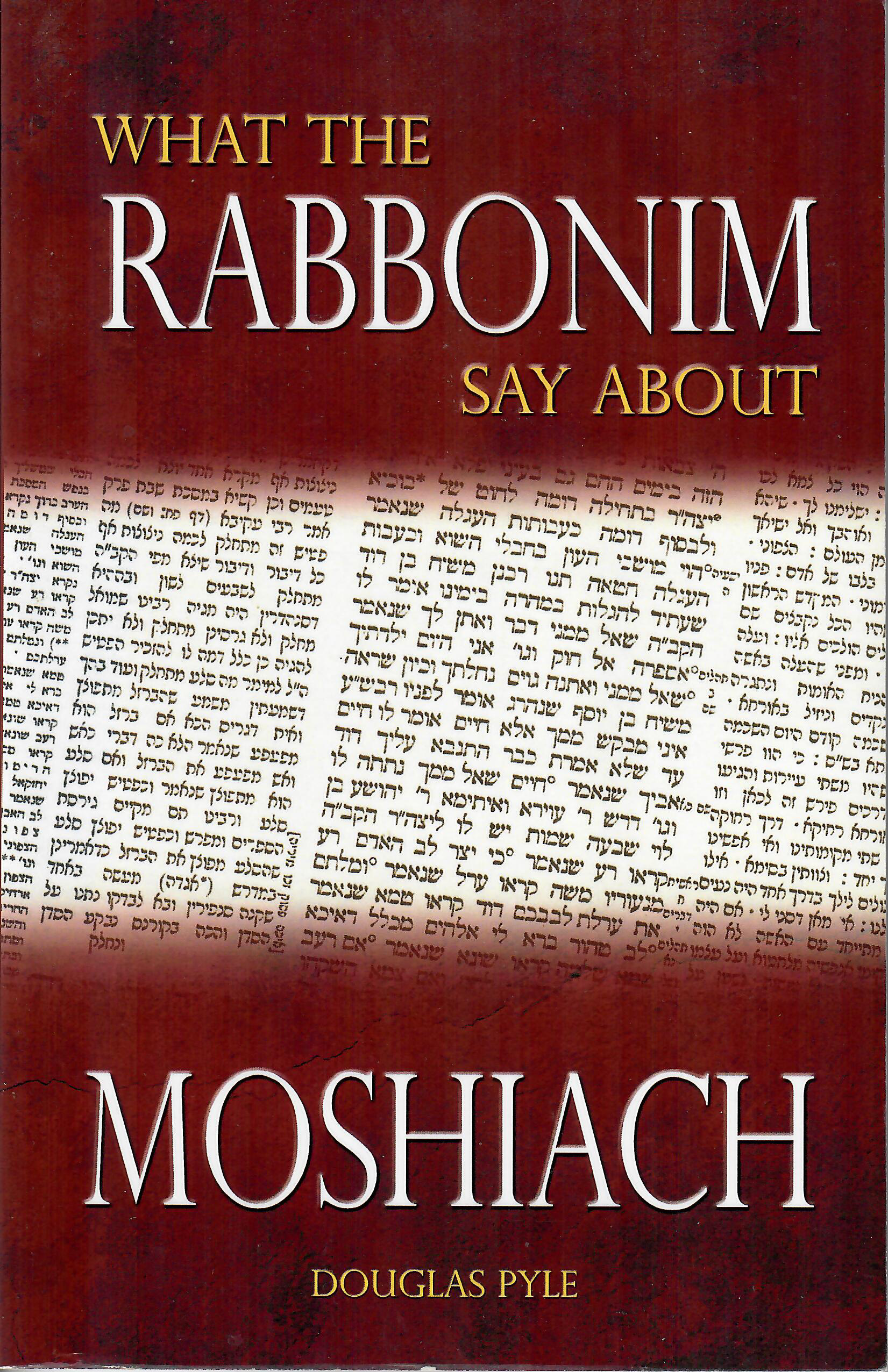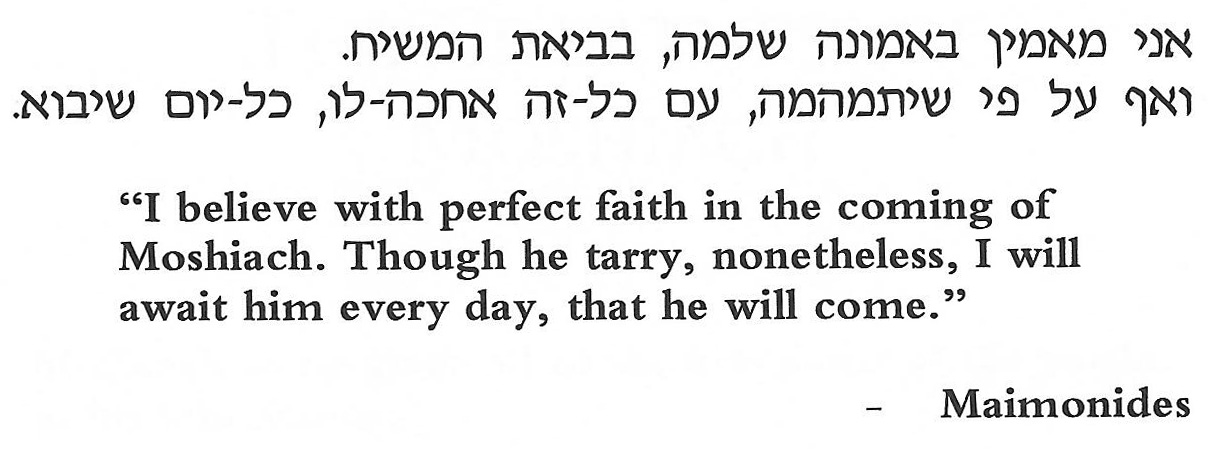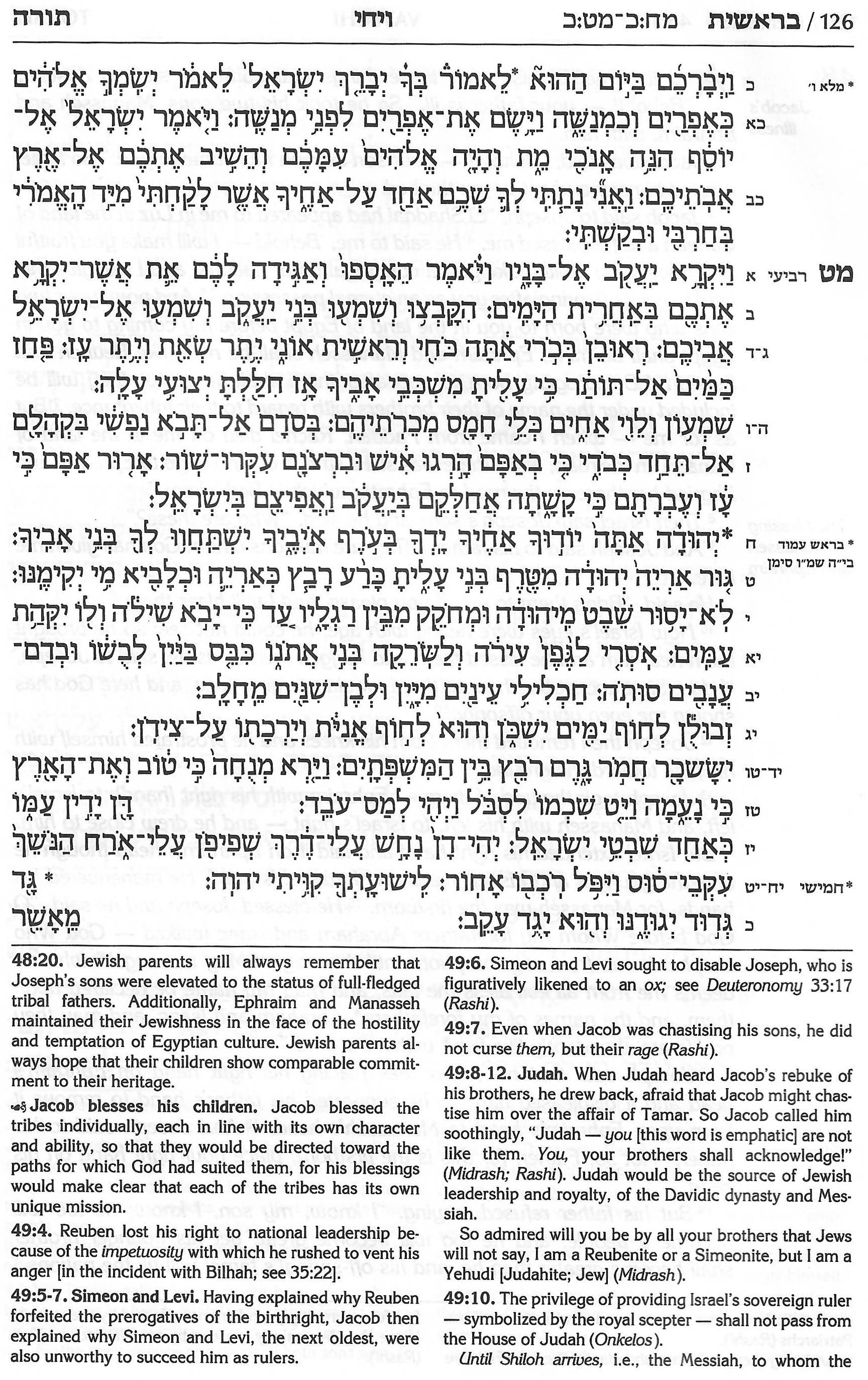
|
| Sat, 26 Apr 2025 10:11:37 -0500 — |
|
|
| וַיְחִ֤י |
|
Parashah Vayechi 5782
Torah Portion: Genesis 47:28 — 50:26 Haftarah Portion: I Kings 2:1–12 by Robert Pill Friday, December 17, 2021 Where Did The Idea Of "Messiah" Come From? |

|

|

|
|
Torah Portion Vayechi Genesis 47:28—50:26 Genesis 49 |

|
|
The similarities of these two passages from the Torah portion and the Haftarah portion both contain instructions of the father to the son or sons for after they have gone.
Genesis 49:1 ends with בְּאַחֲרִ֥ית הַיָּמִֽים That verse is translated "And Jacob called his sons, and said, 'Gather yourselves together, that I may tell you that which shall befall you in the End of Days." |
|
Later, in verse 28 of the same chapter, the instructions are shown to be that Jacob was blessing his sons:
Rather than discussing what will befall them "at the end of time", Jacob describes each son regarding his manner of personality. Yet, when he comes to Judah, in addition to giving a description, he also mentions things that otherwise might have been expected for Joseph, particularly in verse 10!
These verses regarding Judah are really what I want to set the focus on for this 'Drash. More particularly I would like to discuss verse 10. I'm really not quite sure that the word translated to be "Shiloh" should be treated as a noun (as a name) like many translations make it to be. לֹֽא־יָס֥וּר שֵׁ֙בֶט֙ מִֽיהוּדָ֔ה וּמְחֹקֵ֖ק מִבֵּ֣ין רַגְלָ֑יו עַ֚ד כִּֽי־יָבֹ֣א [שילה] שִׁיל֔וֹ וְל֖וֹ יִקְּהַ֥ת עַמִּֽים׃ Each word and compound words with their brief definitions from Ernest Klein,
"A Comprehensive Etymological Dictionary of the Hebrew Language for Readers of English": Some observations/notes regarding this passage:
If ever there is a case to consider שֵׁ֙בֶט֙ to be defined as "Scepter" I would think that it easily could be said in relation to the Creator, King of Kings! But in Job 21, no doubt an ancient text, as presented, the idea of using the word defined as "rod" is clearly appropriate. It does present an idea of "Judgment", as in staff of Judgment, whereas, Sceptre, at least to me gives an impression like that of "The Golden Scepter", when Queen Esther approaches her husband King Ahashveros, having not seen him for 30 days, but where when he sees her he presents his golden scepter, and she saunters over and pinches the tip! That is more or less my sense of scepter. It is sort of like thinking about the British Royals, where we see this grandmotherly looking lady (the queen) mechanically twisting a wave of her hand while her arm remains in one position; not an expression to say hello but sort of saying, you peon! Thus, if you get nothing else from this message, surely you will know how to wave your hand like a British Royal! OK, back to the passage. In reality, both scepter and rod of a ruler are pretty much the same thing! How is it, then, that so many translations translate the word שֵׁ֙בֶט֙ so quickly as scepter, for Genesis 49:10? Certainly, "rod of judgment" would carry similar weight but perhaps not with such a royal tone? I propose that it is due to preconceived notions and not from the passage context itself. To me, most translations "read into" the passage a meaning which expresses/confirms what they already believe! Again, I believe much of the understanding of this verse is derived from preconceived notions read into the text and not necessarily from the plain meaning itself. Defining שֵׁ֙בֶט֙ as scepter, giving the clear idea of royal kingship to the verse, necessitates also the rendering of שִׁיל֔וֹ (Shiloh) to be a personage that even the great Talmudist, Rashi, calls The Messiah (notes following below on Stone Tanakh)! וּמְחֹקֵ֖ק מִבֵּ֣ין רַגְלָ֑יו The phrase, וּמְחֹקֵ֖ק מִבֵּ֣ין רַגְלָ֑יו, literally 'engrave, inscribe from between his foot,' may actually be an idomatic phrase. Notably, the word רַגְלָ֑יו most often translated for this verse as if it is in the plural as "feet", is obviously written in the singular, as in "one foot" or "his foot" as the case may be. Saying "between his foot" doesn't really make a lot of sense, does it? I believe this phrase is related to lawgiving where engraving or inscribing has a sense of codified law. This probably would be translated, again perhaps as an idiom, "enforcer of the law", since a literal translation doesn't make much sense. Many translations, like Sefaria.org and also JPS 1917 give the impression that וּמְחֹקֵ֖ק is a ruler's staff. עַ֚ד כִּֽי־יָבֹ֣א שִׁיל֔וֹ עַ֚ד כִּֽי־יָבֹ֣א שִׁיל֔וֹ "until (when) he comes, bringing peace." Interesting to me is that this particular spelling of what is translated Shiloh, שִׁיל֔וֹ only shows up four times in the Tanakh (Genesis 49:10, Judges 21:21 (twice), Jeremiah 7:12) with a yud following the Shin. Everywhere else it is rendered without the yud, שִׁלֹ֔ה (for a total of just under 35 occurrences). Most other occurrences take upon the meaning of the City of Shiloh. The idea of Messiah is only here in Genesis 49:10. To me, for שִׁילוֹ ("Shiloh"), 'Peace/tranquility' is a better definition. It is, after all, the meaning of the root of the word and, and in my opinion, it fits better into the plain meaning of the passage.
שִׁיל֔וֹ
(shiloh) Definition שׁלה 1 to be quiet, be at ease. שׁלה II to draw out. שׁלו to be quiet, be tranquil, be at ease. שָׁלֵו adj. & n. 1 quiet, at ease, tranquil, restful, carefree. 2 (n.) ease, quietness, tranquility, occurring in the sense Job 20:20 in the phrase לֹא יָדַע שָׁלֵו (= he knew no quietness). [From שׁלו. cp. שֽׁלֵיו.] שֶֽׁלֶו m.n. quiet, tranquility, ease; security (a hapax legomenon in the Bible, occurring Ps. 30:7 in the form שַׁלֽוִי). [From שׁלו.] שַׁלְוָה f.n. 1 quietness, ease, tranquility; security. 2 carelessness, indifference. [From שׁלה I.] וְל֖וֹ יִקְּהַ֥ת עַמִּֽים וְל֖וֹ יִקְּהַ֥ת עַמִּֽים Pretty much literally, 'to him the obedience of the people [will be due].' The word translated as obedient, יִקְּהַ֥ת, the definiton at least in Klein's Etymological Dictionary is taken from the root יקה and notes that probably means "obedience." I am not sure that the Stone Edition Tanakh doesn't take the word at its face value as if it is a derivation (perhaps mispelled) of קהל (=to assemble, gather). I have provided three Jewish translations of the verse, plus my own! Stone Edition Tanakh, Genesis 49:10 Sefaria.org, Genesis 49:10 JPS 1917, Genesis 49:10 So, on the surface, this verse is probably just not easily translated; neither does the ancient wording allow for the only place in the Tanakh where שִׁיל֔וֹ must carry a definition altogether disparate from other occurrences. In my opinion, the word should more likely not be treated as a noun at all. Doing so almost requires for it to point to a personage or a city. Rather, it could easily carry the idea, in context, of "until a time of peace and tranquility comes." The following is how I think this verse may be translated (Genesis 49:10): OK, there are a couple of commentaries on this verse I would like to compare. The first is from the Stone Edition Tanakh and the second from a website, www.gotquestions.org, giving a Christian perspective. Stone Edition Tanakh, Genesis 49:10 with notes Genesis 49:10 (Stone Tanakh) The scepter shall not depart from Judah* nor a scholar from among his descendants until Shiloh arrives* and his will be a an assemblage of nations. [*NOTES Stone Edition Tanakh, pages 126-127] 49:10. The privilege of providing Israel's soverign ruler – symbolized by the royal scepter – shall not pass from the House of Judah (Onkelos). A Christian Perspective
(https://www.gotquestions.org/shiloh.html) The blessing on Judah and his tribe contains several elements. For one thing, his descendants would be strong and receive the praise of the other tribes of Israel (v. 8-9). This was fulfilled in David, a strong and mighty warrior and king, and ultimately by the Messiah who came from the line of Judah. Verses 11 and 12 are somewhat obscure in that they contain poetic, hyperbolic language. Generally, this language describes prosperity so great that people will be able to tie a donkey to a choice vine and let it eat its fill because there is such abundance. This is likely a prophecy concerning the millennium. It will be a time of peace (Micah 4:2-4; Isaiah 32:17-18), joy (Isaiah 61:7, 10), comfort (Isaiah 40:1-2), and no poverty or sickness (Amos 9:13-15; Joel 2:28-29). In verse 10, we find the reference to Shiloh and His future coming. This obscure word is variously interpreted to mean “the sent” (John 17:3), “the seed” (Isaiah 11:1), the “peaceable or prosperous one” (Ephesians 2:14), that is, the Messiah (Isaiah 11:10; Romans 15:12). Prior to Shiloh’s coming, the tribe of Judah would continue to maintain power and strength, signified by the scepter—the symbol of authority and rule of law. This first began in David, who was of the tribe of Judah, and continued to the Babylonian captivity, when another sort of government took place, described in the next part of the verse. A ‘lawgiver’ can be any ruler who has jurisdiction over others, and from the Babylonian captivity through the time of Christ, Israel was under the rule of other lawgivers. When Shiloh—the Messiah—came, the scepter of rule over Israel departed from Judah and rested in the hand of the King of Kings, where it remains today, although many still reject Him. He is the Lawgiver at whose feet we now sit for teaching in truth and righteousness through His Word, the Bible. The “obedience of the peoples” was and still is offered to Him, replacing obedience to the law of Moses. From the beginning, there were great gatherings of people who heard Him preach and saw His miracles. Multitudes witnessed His death and His post-resurrection appearances. Multitudes more were converted to Christ, embraced His doctrines, professed His religion, and have lived in Him ever since. Here is the meaning of the “obedience of the peoples to him” (v. 10), which will continue until Shiloh comes again to rule and reign over all during the millennium. At that time, every knee will bow and every tongue confess that Jesus Christ is Lord, to the glory of the Father (Philippians 2:9-11). So, this Christian perspective also appears to intrepret the passage based upon its own preconceived notions! "until Shiloh comes" would give the impression that this is a direct prophecy regarding the coming of the Messiah! In the case of Christianity, the prophecy sort of occurs twice, first with Jesus and later at "his second coming." Interestingly, it appears that 'Until Shiloh comes' also means 'the Messiah' as extended by prominent rabbis! Rather than just allow the passage to carry the simple and plain meaning, it certainly appears to me that translators have allowed 'wild' interpretations to go unchecked. To that end, I return to the Stone Edition Tanakh comment for verse 10: The Privilege of providing Israel's sovereign ruler – symbolized by the royal scepter – shall not pass from the House of Judah (Onkelos). Until Shiloh arrives, i.e., the Messiah, to whom the kingdom belongs (Rashi). The word until does not mean that Judah's ascendancy will end with the coming of Messiah. To the contrary, the sense of the verse is that once Messiah begins to reign, Judah's blessing of kingship will become fully realized (Sh'lah), for all the nations will acknowledge him and pay homage to him. Prominent Rabbinic Messianic Writings Came After Birth Of Christianity! In my opinion, rabbinic writings regarding the Messiah have mostly come into prominence following the advent of Christianity, NOT BEFORE IT! As such, it appears to me that rabbinic thinking regarding the Messiah is based upon an interpretation forced by public dissimination regarding the birth and death of Jesus, rather than a natural interpretation based upon the Scriptures from the time of the ancients. In other words, I believe the idea of the Messiah is a relatively new thing! Prominent Rabbinic commentators from the modern age such as Rashi (born 1040), Maimonides (1138 or late 1137) from their writings have given us the "Jewish" take on the advent of a Messiah. I believe that has come about from upon having to counter the Christian arguments developed mostly after the Roman Emperor Constantine in around the 300s of the modern era. https://www.sefaria.org/texts/Talmud/Yerushalmi Sefaria.org, Genesis 49:10 - or -
The following is how I think this verse may be translated (Genesis 49:10): Obviously, I have not exhausted ideas about these verses. I'm hoping that from this brief message may come an appreciation of various translations but also an open mind to seeing the passage differently. Shabbat Shalom!
References for Rashi, Maimonides, Constantine (https://www.myjewishlearning.com/article/who-was-rashi/) : Rabbi Solomon ben Isaac (Shlomo Yitzhaki), known as Rashi (based on an acronym of his Hebrew initials), is one of the most influential Jewish commentators in history. He was born in Troyes, Champagne, in northern France, in 1040. (https://www.myjewishlearning.com/article/maimonides-rambam/) : Moshe ben Maimon was born in 1138 or late 1137. “Maimonides” is the Greek translation of “Moses, son of Maimon,” whereas the acronym RamBaM (רמבּ״ם) is its Hebrew equivalent. He grew up in Córdoba, in what is now southern Spain. Reared in a prosperous, educated family, the young Maimonides studied traditional Jewish texts like Mishnah, Talmud and Midrash under the tutelage of his father, Maimon. (An accomplished scholar in his own right, Maimon was the intellectual scion of legendary halachist [Jewish legal scholar] Isaac Alfasi.) (https://www.britannica.com/biography/Constantine-I-Roman-emperor) : Constantine the Great, Latin in full Flavius Valerius Constantinus,
(born February 27, after 280 CE?,
Naissus,
Moesia [now Niš, Serbia]—died May 22, 337, Ancyrona, near
Nicomedia,
Bithynia [now İzmit, Turkey]), first
Roman emperor to profess Christianity.
He not only initiated the evolution of the empire into a Christian state but also provided
the impulse for a distinctively Christian
culture that prepared the way for the growth of
Byzantine and Western
medieval culture. |
| Page Images, Stone Edition Tanakh, pps. 126-127 – Genesis 49 | |

|

|

